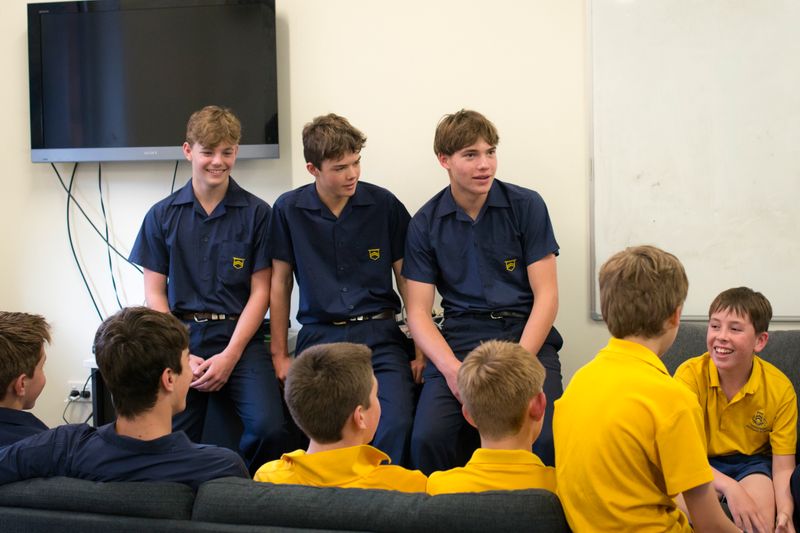“In doing so, the Year 10 boys act as coaches to guide the boys through these problems, providing advice from personal experience via the embedded leadership curriculum. The intention of this curriculum is to provide a shared language for emotional expression, thus providing Year 7 boarders with the vocabulary to express themselves and to model vulnerability and reciprocal patterns of self-disclosure.”Mr Henry White, Head of Corfe House

A residency designed to foster a positive sense of belonging.
As a boarding master of adolescent boys, my role fundamentally concerns pastoral wellbeing and character development to support a successful academic journey. A positive sense of belonging — where boarders feel safe, supported and heard — is fundamental to an effective boarding environment. As such, I felt there was a distinct connection between the International Boys’ Schools Coalition’s (IBSC) theme for the 2024–25 Action Research Cohort, “Boys and Belonging” and what I believe is best practice boarding in Corfe House.
Through 10 years of experience in boys’ boarding houses, I’ve observed a reluctance among boys to voice their concerns and express themselves emotionally, thus allowing themselves to be vulnerable amongst their peers and immediate support network. This reluctance significantly impacts their ability and willingness to disclose problems and seek help. Consequently, it affects their sense of belonging within the boarding environment and has broader implications for their holistic development. This issue is particularly pertinent for boarders in Corfe House, who are in the early stages of identity development.

I’ve noticed that even boys with emotional maturity or the tools to communicate their concerns are not necessarily inclined to do so. This observation has led me to consider the connection between a boarder’s sense of trust and their willingness to display vulnerability, likely influenced by cultural norms related to masculine identity rather than just their ability to articulate themselves. I believe that fostering a heightened sense of belonging within a boarding environment may effectively counter these cultural norms.
When considering this context amongst the larger body of research literature, it is frightening to consider the bigger picture at play — that being the damning statistics surrounding Australian men and issues pertaining to men’s mental health and suicide. I’d like to think these concerning trends can be countered by positive cultural shifts that promote male vulnerability and allow men to speak out and seek support without fear of shame or being perceived as weak.
As such, the purpose of my research project is to provide my Corfe House boarders, who embark upon their broader boarding journey at a relatively impressionable age, with the necessary skillset, confidence and vernacular to effectively communicate issues presenting as barriers to their pastoral wellbeing and sense of belonging. In doing so, they are encouraged and empowered to be vulnerable rather than repressing their feelings — a common trait we see with adolescent boys, often influenced by cultural factors and a lack of words to articulate their emotions.

To enable this project, we initiated the official Corfe House Year 10 Service and Leadership Residency Program at the commencement of Term 2 in 2024 — a residency for Year 10 boarders with aspirations for leadership and a willingness to serve. So far, we’ve been incredibly impressed by the newfound sense of calm within Corfe House and the positive mentoring that has developed organically. Within this residency, we have embedded a Leadership and Character Education Program for Year 10 residents comprising explicit teaching in leadership, coaching, peer support and lessons in positive masculinity. Through this program and weekly mentoring and coaching sessions where the Year 10 residents embed these skills and knowledge within their own “Mentor Session”, we have sought to educate and broaden student perspectives that align with the TGS purpose — “Educating boys and developing their good character for life.”
During the mentoring sessions, the Year 10s share previous challenging experiences from their own time in Year 7 Corfe House boarding (thus modelling vulnerability), allowing an informal platform for Year 7 boys to reciprocate and share any current challenges they are facing.
Furthermore, as a means of measuring Corfe House boarders’ increased willingness to be vulnerable, Year 6 and 7 Corfe House boarders undertake a daily wellbeing survey each evening designed to gauge boarders’ daily emotional wellbeing and their willingness to disclose their problems, thus providing a platform to demonstrate their vulnerability.
While a boarding leadership residency is not a revolutionary concept, the embedded Leadership and Character Education Program and new methods to measure boarder pastoral wellbeing offer a valuable point of difference for our School. In addition, Year 10 residents become participants in the wellbeing and pastoral care of younger boarders — a novel experience that fosters personal relationships and good character development — rather than simply being a presence. Moreover, by empowering Year 10 residents with leadership capabilities and opportunities to exercise these skills, they also develop their own leadership identity and sense of belonging through ownership within the larger boarding program.
Latest Blog
TGS Strength and Conditioning Program
Toowoomba Grammar School has a unique approach to athlete development that focuses on providing students with the skills, tools and mindset required to succeed in sports and life. At TGS, the long-term athlete development (LTAD) philosophy is ingrained in every aspect of the School's approach to sport and fitness. The LTAD philosophy emphasises the importance of age-appropriate training and skill development over a long period of time. This approach recognises that athlete development is a…
We Knew Them Before They Were Stars
Our boys at Toowoomba Grammar School are fortunate that Performing Arts is as popular as sport and academics, thanks to our culture of respect and inclusivity. Boys are supported and encouraged to immerse themselves in music, drama and art and are not afraid to chase their dreams in these fields. The success of our performing arts students dates back decades, with our Old Boys performing all around the world in theatre, music, film and photography and are accomplished and well recognised in…
Country Roads Take Me Home
Toowoomba Grammar School boarding provides the ideal living environment for our boys while they develop the values that will define their character. Throughout the course of this year, I have been privileged to visit many of the towns and properties that our TGS boarders call home. When walking around those towns wearing a shirt with a TGS crest, it doesn’t take long to meet an Old Boy or to be asked about one of the boarders currently at the School. Our boarding staff pride themselves on…
TGS Corfe House - A Home for Young Boarders
In Toowoomba Grammar School’s Boarding Program, Years 5 to 7 students reside at Corfe House – a nurturing environment providing close pastoral support and guidance to the School’s youngest boarders. The skills, relationships and perspectives that boys develop here set them up for the rest of their boarding and school journey. Toowoomba Grammar School understands the challenges for young students transitioning into boarding. Leading the way in creating a ‘home away from home’ is the Corfe House…
TGS Mates Program - Character Building Education
Current research into character education has shown that educators should not be focusing solely on preparing students for their Year 12 final exams but should be supporting them to become humans who exhibit good character and virtues to contribute to creating a healthier society (The Jubilee Centre, 2022). The Jubilee Centre, which is attached to the University of Birmingham in the UK, maintains that good character is the foundation for improved attainment, better behaviour, increased…
Our TGS Old Boys' Wall of Achievement
The next time you visit the School grounds, pause for a moment at the Toowoomba Grammar School Old Boys' Wall of Achievement. This concept was the initiative of the then Deputy Headmaster, Mr Roger Buttenshaw, and was supported by the Board of Trustees, Headmasters Mr Hugh Rose and Mr Peter Hauser, and the TGSOBA - Toowoomba Grammar School Old Boys' Association. The opening of the Wall of Achievement took place in 2003. Thousands of TGS Old Boys have gone on to lead productive and valuable…
A Musical Reflection
As Director of Performing Arts, there is perhaps no bigger undertaking than a School musical. It requires an enormous effort from a huge team of teachers and students, and to get all these moving parts heading in the same direction is certainly no mean feat. The 2023 co-production of Footloose was my first time involved in a Toowoomba Grammar School and Fairholme College musical, and I found it to be a very rewarding, though exhausting, experience. The process began in Term 3, 2022, as my…
TGS Success in GPS Sport
In 2023, Toowoomba Grammar School witnessed a remarkable resurgence in several of our sports programs, marking a year of triumph and growth. Although an elusive GPS premiership did not fall our way, a number of our 1st teams competed to the final whistle in Round 9 of their respective competitions, vying for their premierships. The achievements of our boys on the field and court were nothing short of exceptional, reflecting the commitment, dedication and character development that participation…
An Exceptional Learning Experience
As a member of the Junior School Leadership Team at Toowoomba Grammar School, my role involves ensuring that the Junior School’s Teaching and Learning programs are designed, implemented and managed effectively. This role is grounded in the vision, mission, and values of TGS and is crucial in supporting the Head of Junior School and the Director of Studies in providing an exceptional learning experience for our boys. At TGS Junior School, we prioritise the use of explicit teaching to ensure that…